Every year, millions of individuals deal with an alcohol use disorder (AUD) or in another words The Sinclair Method (TSM) which is basically a medication-assisted, evidence-based form of treatment. And while many are able to recover with professional addiction treatment, some also try medications to stop drinking. It’s important to note, though, that medications to quit drinking are only of many evidence-based treatment options.
What does that mean? In almost every instance, medication to stop drinking is more effective when paired with alcohol counseling and other addiction treatment methods. Keep reading to learn more about the nature of alcoholism and how medications to quit drinking could play a role in your recovery.
What Medications Can Help You Stop Drinking?
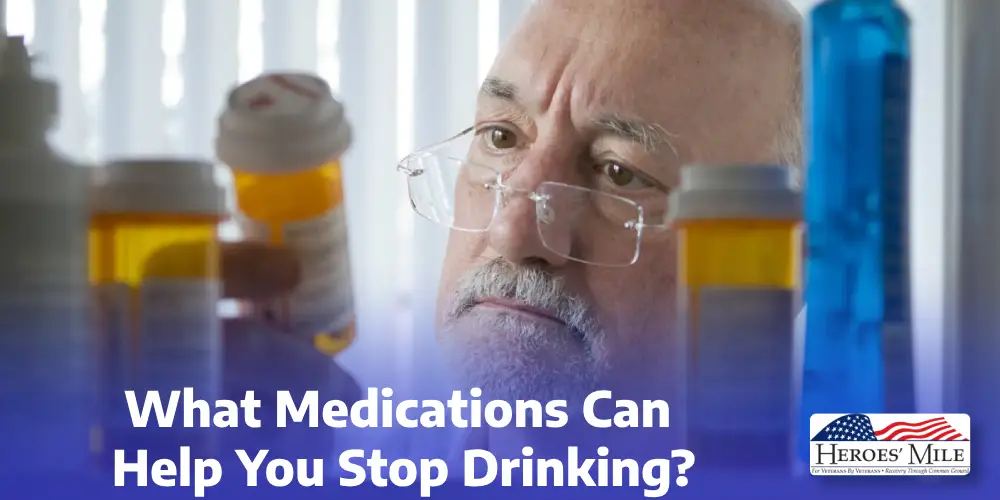
What Medications Can Help You Stop Drinking?
It’s important to remember that medication to quit drinking is usually a separate treatment option from a medical alcohol detox. Where medications in an alcohol detox setting typically only last a few days to a week, medications to quit drinking could be taken for a few weeks, a few months, or indefinitely.
Right now, three pills have been FDA-approved as medications to stop drinking. Those three medications are:
- Acamprosate (Campral)
- Disulfiram (Antabuse)
- Naltrexone (Vivitrol)
- Nalmefene
Keep in mind that each of these medications works differently, and an individual might see greater benefit with one medication over another. To help you make an informed choice, we’ll break down what each pill to quit drinking has to offer.
Acamprosate (Campral)
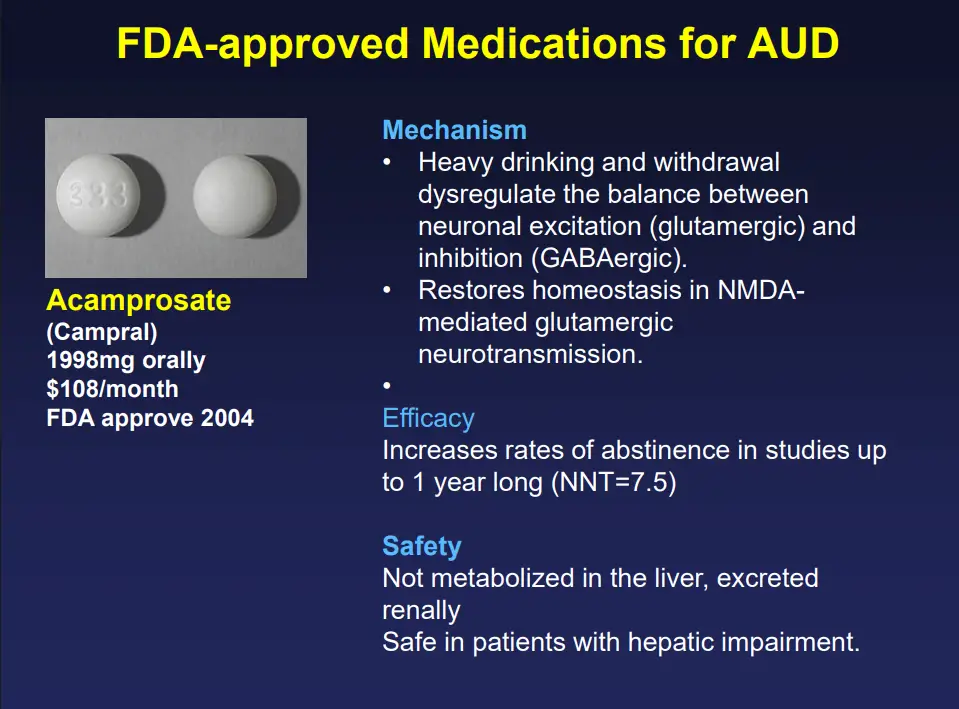
Acamprosate (Campral)
This medication requires some background information: In an individual’s brain, there is a neurotransmitter called GABA. And GABA is important, because it can calm the central nervous system and help alleviate feelings of stress and anxiety. Unfortunately, long-term alcohol abuse often disrupts the natural production of GABA, which can increase the risk of mental illness and addiction, particularly among individuals who are already predisposed to both issues.
Acamprosate‘s chemical makeup is very similar to GABA’s. This means that when it’s taken by someone with an alcohol use disorder, it can help restore some balance to the brain’s chemistry. As a result, individuals on this medication may experience less stress, which can lower their risk of dealing with unpleasant side effects from post-acute alcohol withdrawal symptoms (PAWS), like insomnia or anxiety.
Like all medications to quit drinking, however, it’s important to note that Campral cannot cure addiction. It does not address the underlying causes of addiction, and thus works best when partnered with behavioral health treatments. Moreover, this medication is well-tolerated by the liver, but it can interact negatively with the kidneys, meaning that it should not be used by individuals with renal disease.
Disulfiram (Antabuse)
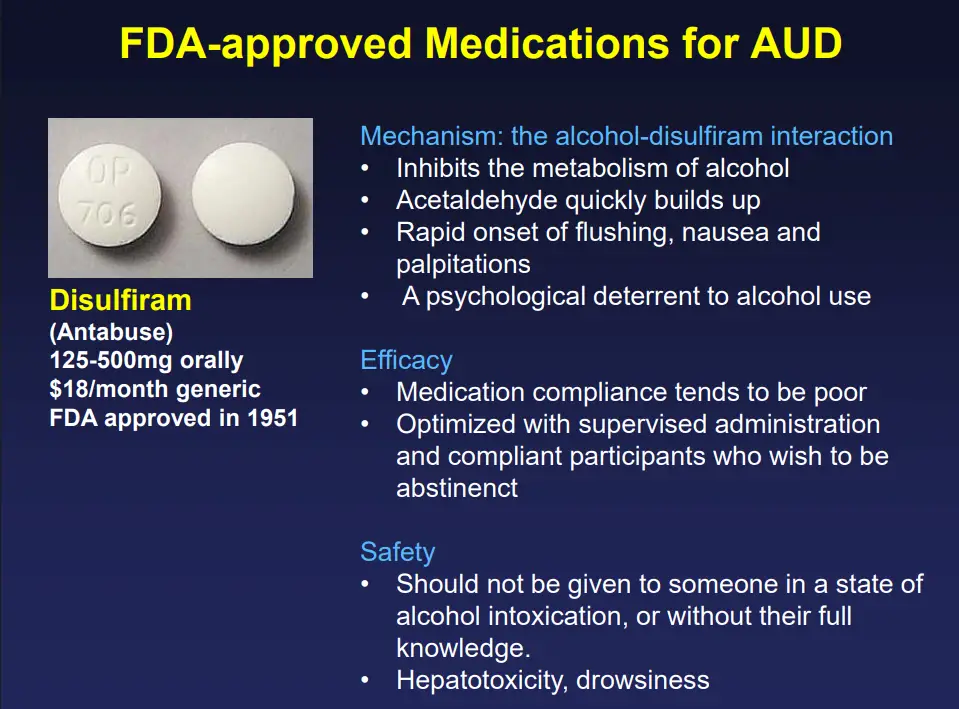
Disulfiram (Antabuse)
Disulfiram is the oldest medication on this list, and it has been helping people quit drinking since 1949. By altering the way your body breaks down alcohol, disulfiram stops it from properly metabolizing. So instead of getting a “buzz,” your body actually becomes sick when you take alcohol, which greatly reduces your risk of relapse.
When an individual drinks alcohol while taking Antabuse, they may experience side effects like:
- Increased heart rate
- Nausea and vomiting
- Headache
- Thirst
- Respiratory problems
- Low blood pressure
- Vertigo
When taken for prolonged periods of time, disulfiram can damage the liver. For this reason, it is not generally recommended for individuals with impaired or weakened liver function.
As you can see, disulfiram works by discouraging drinking. However, it does not prevent cravings, nor does it address the behavioral health issues (like post-traumatic stress or depression) that may lead to your drinking. For this reason, Antabuse generally proves more effective when taken alongside alcohol addiction treatment options like group therapy or 12-step counseling.
Naltrexone (Vivitrol)
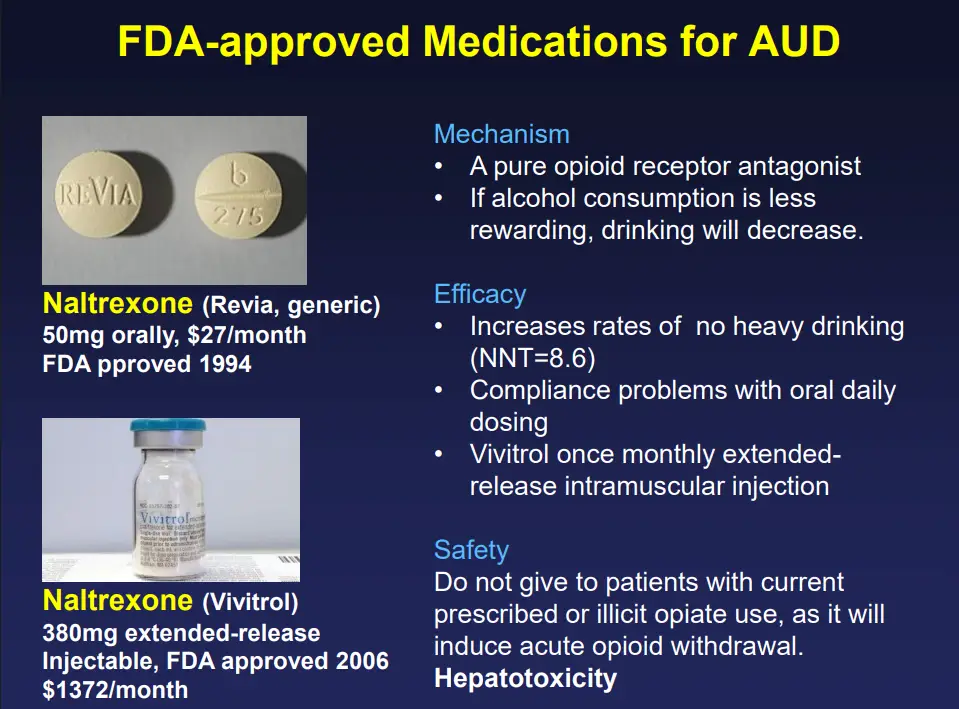
Naltrexone (Vivitrol)
Naltrexone does more than treat alcohol addiction—in fact, it was originally developed as an opioid addiction medication. When someone on naltrexone takes opioids, they feel no pleasurable response. And as luck would have it, Vivitrol has proven effective at helping people quit drinking as well.
When taken as prescribed, Vivitrol can help reduce alcohol cravings, thus breaking the cycle of craving and reward that is inherent in addiction. For this reason, some people prefer it to Antabuse since it stops cravings directly.
However, naltrexone does not work for everyone as a medication to stop drinking. It can impair liver function, so it is not generally recommended for those with liver damage. Like with other medications to quit drinking, naltrexone does not stop the root issues behind addiction, so it is most effective when paired with behavioral health strategies to quit drinking.
Nalmefene (from Europe)
Nalmefene (sold under the brand name Revex among others) is a medication used to help reduce alcohol consumption in people with alcohol dependence. It is an opioid receptor modulator that works similarly to Naltrexone but has a longer half-life and a slightly different mechanism of action.
How Does Nalmefene Work?
- It blocks opioid receptors in the brain, reducing the pleasurable effects of alcohol.
- It helps decrease cravings and the urge to continue drinking.
- Unlike Disulfiram, it does not cause an adverse reaction when alcohol is consumed.
Nalmefene vs. Other Medications for Alcohol Dependence
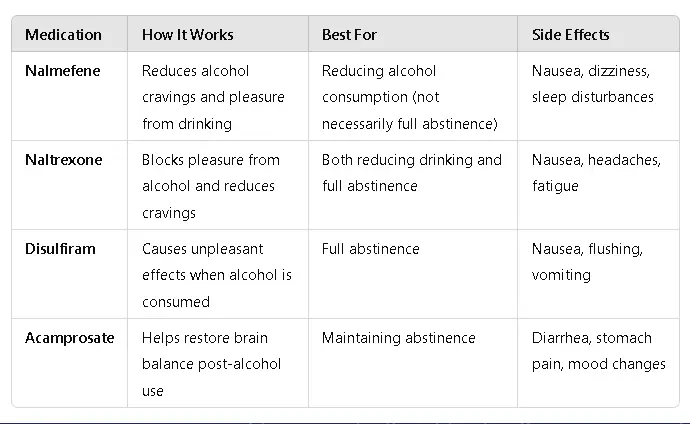
- Nalmefene vs. Other Medications for Alcohol Dependence
Who Can Use Nalmefene?
- People who want to reduce drinking rather than quit completely.
- Individuals who do not have opioid dependence (as it can cause withdrawal).
- Those who need an alternative to Naltrexone due to side effects.
Video
How I overcame alcoholism, Claudia Christian – TED Talk
A hugely successful actress who saw her personal life and career tested by addiction, Claudia shares her journey of overcoming alcoholism and offers fresh perspectives on alcohol use disorder treatments. Actress discusses her success story using Nalmefene for alcohol use disorder.
News Audio
Ozempic shows promise for alcohol and drug addiction, study finds – NPR
Ozempic, Mounjaro and similar medications for Type 2 diabetes and weight loss could also help people struggling with addiction, according to a new study.
Researchers found that people addicted to alcohol who also had a prescription for Ozempic or similar medications had a 50% lower rate of binging on alcohol, compared to people who were not on the medications. And people with opioid use disorder who were taking the medications had a 40% lower rate of opioid overdose.
FAQ
- What medications can help me stop drinking?
Several FDA-approved medications, including Nalmefene, Naltrexone, Disulfiram, and Acamprosate, can help reduce cravings and prevent relapse in alcohol use disorder. - How does Naltrexone help with alcohol addiction?
Naltrexone blocks the euphoric effects of alcohol, reducing the urge to drink and making alcohol consumption less rewarding. - What happens if I drink while taking Disulfiram?
Disulfiram causes severe reactions, such as nausea, vomiting, headache, and flushing, if alcohol is consumed, discouraging drinking. - Are there any side effects of medications for alcohol dependence?
Yes, side effects vary by medication. Common ones include nausea, dizziness, and fatigue. It’s best to consult a doctor to find the right medication for you. - Can I take medication to stop drinking without therapy?
While medications can help reduce cravings, they are most effective when combined with therapy and support programs like counseling or Alcoholics Anonymous. - What is Nalmefene, and how does it help with alcohol dependence?
Nalmefene is an opioid receptor modulator that reduces the urge to drink by blocking the pleasure effects of alcohol. It is often prescribed for people who want to reduce drinking rather than quit entirely.
